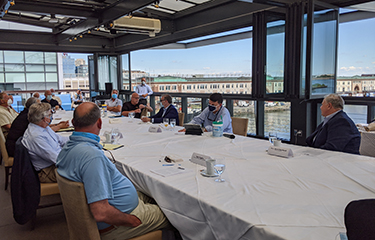U.S. Department of the Interior Secretary David Bernhardt sat down with a number of fishing industry leaders on 21 July to discuss the industry’s concerns related to a number of offshore wind energy projects.
The projects are located off the coast of New England, and groups representing fishing industry interests in the area have repeatedly objected to the proposed layouts of the projects, particularly Vineyard Wind, one of the largest proposed projects. The groups have called for greater inclusion in the decision-making on the project, which they said has been lacking.
Bernhardt met with both industry and regulatory stakeholders to discuss the projects, and reassured fishermen that the administration of U.S. President Donald Trump has taken an interest in ensuring that wind projects accommodate the commercial fishing industry.
“Ultimately, I need to have a development program that’s done in a way that’s sustainable for everybody,” Bernhardt said in a press conference after the meeting. “You don’t start with a lot of conflict. That’s not the recipe for success, and the consequences of these are significant. They’re significant to families, they’re significant to people, they’re significant for safety issues. We need to do everything right. That’s our obligation.”
According to Bernhardt, the government, specifically the Bureau of Energy Management (BOEM), underestimated the scope and rapid progression of offshore wind energy when it initially opened the areas up for wind energy leases.
“It’s easy to come in 10 years later and say what people thought. Let me be very clear, BOEM did not, even in the initial draft of Vineyard, BOEM did not, in my opinion, adequately present the expansion they were going to see,” Bernhardt said. “They would say, 'Of course they didn’t,’ because they didn’t know it was going to happen.”
Bernhardt said while the Trump administration supports wind energy projects off the coast of the U.S., it believed doing it in a way that is sustainable from the start is important.
“I am very eager to do it, but I am eager to do it in a way that works for the federal agencies, that works for the other people that use the regions,” he said. “Let me put it this way, in the West, we do wind. You know where we don’t put a windmill? In the middle of a highway. You could drive all the roads of the west, and you’re not going to drive into a windmill in the middle of the highway.”
Bernhardt wasn’t the only regulatory presence at the meeting – representatives of the New England Fishery Management Council (NEFMC) was also present to provide additional feedback from a fishing regulations perspective.
“We weigh in on the wind energy things because of the potential impacts on the fishing industry, and the potential impacts on the science we use to manage the fishing industry,” NEFMC Executive Director Thomas Nies told SeafoodSource. “We actually devote a lot of time to try and track what’s going on, and discuss what’s going on.”
NEFMC, he added, coordinates with NOAA fisheries, the Northeast Fisheries Science Center, and the Mid-Atlantic Fishery Management Council to address concerns.
The fishing industry representatives who attended the meeting said they were reassured by Bernhardt’s presence, and the Department of the Interior’s apparent interest in their viewpoints.
“This is the second time that I’ve met with Secretary [Bernhardt]. I met with him before at his office in Washington D.C., and it’s very clear to me that they’re doing everything they can to help us,” Jeff Reichle, owner and chairman of the board of Lund’s Fisheries Inc., told SeafoodSource. “I truly believe that Secretary Bernhardt and President Trump want to do the right thing, and they realize that there is an issue here.”
Reichle said a large part of the industry’s frustrations stems from the lack of input the industry has had on the projects since they were first proposed.
“The fishing industry has no seat at the table, and all we’re getting from our governors in those states, and also from the wind industry, is lip-service,” he said.
Reichle pointed out that he isn’t opposed to wind energy – he has actually been an investor – it’s that the industry wants to be involved in the discussions.
“The whole focus has to be not replacing an industry with another industry,” Reichle said. “The whole focus is, how do we have two successful industries? And that’s been missing from the very start of this process.”
Jon Williams, the owner and CEO of the Atlantic Red Crab Company, added that the meeting was a step in the right direction for the industry.
“We’ve been to the White House, and we’ve been to different meetings of previous administrations, and everything is told to you, and then you walk out and say, ‘Well, that was a waste of time,’” he told SeafoodSource. “With regards to this administration, certainly I think that they legitimize our fishery, our industry, more than any administration, be it Republican or Democrat, than I can remember.”
Williams said he is looking for greater fishing industry participation in the discussion on how wind energy projects are developed.
“I’m not opposed to renewable energy by any means, I’m an advocate of it,” Williams said. “But it has to go through the correct process.”
Photo by Chris Chase/SeafoodSource







